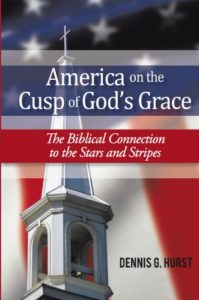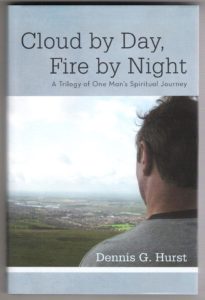400 years: Plymouth Rock inspires
27 Sunday Dec 2020
Written by dennisghurst in Godliness, Inspiration, Knowledge, Origins
Tags
Barack Obama, Christ, Christianity, Conservatism, Constitutional Republic, Donald Trump, Everlasting, Experience, Family, Freedom, Genealogy, God, Jesus Christ, Lessons, Let Freedom Ring, Liberty, Life, Posterity, Roe vs Wade, Self-Preservation, Teaching, Texas, The Federalist, United States, Washington, Wisdom
Share it
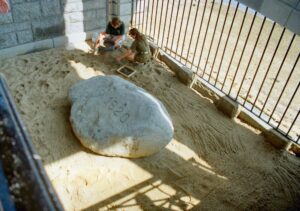
400 years; Plymouth Rock inspires…
For I know the thoughts that I think toward you, saith the Lord, thoughts of peace, and not of evil, to give you an expected end. Then shall ye call upon me, and ye shall go and pray unto me, and I will hearken unto you. ~ Jeremiah 29: 11-12
Having lived within the environs of Plymouth Rock, Massachusetts for nigh on most of the 1980’s, yours truly can vouch for the fact that yes, it’s a truly, truly special experience. Especially so this year, as December 21 2020 logged the 400th anniversary of the Pilgrims’ arrival to the Eastern shore of the American Continent.
50 years on following their arrival, Samuel Danforth preached in Boston in 1670, a sermon titled “A Brief Recognition of New England’s Errand into the Wilderness”, into which was included:
“You have solemnly professed before God, Angels and Men, that the Cause of your leaving your Country, Kindred and Fathers houses and transporting your selves with your Wives, Little Ones and Substance over the vast Ocean into this waste and howling Wilderness, was your Liberty to walk in the Faith of the Gospel with all good Conscience according to the order of the Gospel, and your enjoyment of the pure Worship of God according to his Institution, without humane Mixtures and Impositions.”
“Now let us sadly consider whether our ancient and primitive affections to the Lord Jesus, his glorious Gospel, his pure and Spiritual Worship and the Order of his House, remain, abide and continue firm, constant, entire and inviolate. Our Saviour’s reiteration of this Question, What went ye out into the Wilderness to see? is no idle repetition, but a sad conviction of our dullness and backwardness to this great duty, and a clear demonstration of the weight and necessity thereof.”
Danforth’s sermon reads as a conviction of those who have forgotten the faces of their fathers and the purpose of the call to all believers, a sentiment that he was not alone in advancing at the time. Even then, in 1670, there was concern the Pilgrim spirit was being lost.
********************
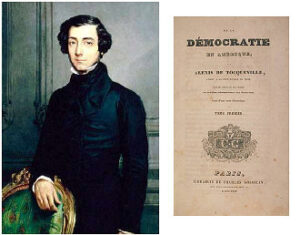
400 years: Plymouth Rock inspires… Alexis de Tocqueville…
In 1835 on his visit to America, Alexis de Tocqueville wrote of the band of pilgrims who stepped onto the shores of what would later become Plymouth, Massachusetts as: “The emigrants were about 150 in number, including the women and the children. Their object was to plant a colony on the shores of the Hudson; but after having been driven about for some time in the Atlantic Ocean, they were forced to land on that arid coast of New England which is now the site of the town of Plymouth.”
“The rock is still shown on which the pilgrims disembarked. This rock is become an object of veneration in the United States. I have seen bits of it carefully preserved in several towns of the Union. Doesn’t this sufficiently show how entirely all human power and greatness is in the soul of man?”
“Here is a stone which the feet of a few outcasts pressed for an instant, and this stone becomes famous; it is treasured by a great nation, its very dust is shared as a relic: and what is become of the gateways of a thousand palaces?”
********************
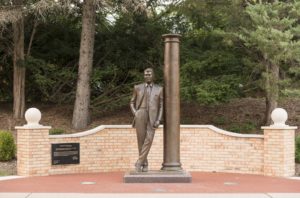
400 years: Plymouth Rock inspires… Hillsdale College … statue of Ronald Reagan
On the 300th anniversary of the Plymouth Rock, Calvin Coolidge proclaimed: “Amid the solitude they set up both hearthstone and altar; the home and the church. With arms in their hands they wrung from the soil their bread. With other arms they gathered in the congregation to worship Almighty God. But they were armed, that in peace they might seek divine guidance in righteousness; not that they might prevail by force, but that they might do right though they perished.”
We continue to face similar struggles of cooperation, yet our cohesion as a nation still depends on loving our neighbors and preserving our freedoms. Absent the Christian faith that united and guided the Pilgrims and Puritans, survival today is in some ways more complicated and difficult. Yet we continue to return to the principles of our foundational freedoms, religious and otherwise.
After eight years in office, President Ronald Reagan conveyed to the American people the state of their 400-year-old city upon a hill: “How stands the city on this winter night? More prosperous, more secure, and happier than it was eight years ago. But more than that: after 200 years, two centuries, she still stands strong and true on the granite ridge, and her glow has held steady no matter what storm. And she’s still a beacon, still a magnet for all who must have freedom, for all the Pilgrims from all the lost places who are hurtling through the darkness, toward home.”
********************

400 years: Plymouth Rock inspires…
What started in Plymouth changed the world forever – and changed it for the better. It was an audacious effort – a group of zealous religious men and women who put all their resources behind the creation of a new community in a new land, foreign to them in every way. They had much more in common with the first Americans to step foot on Mars than they did with the colonization efforts in other places around the world.
It’s incumbent upon us as Americans to renew this spirit in every generation – not to sit back on what prior generations built, but to strive out into the wilderness ourselves – the areas of life on this corner of God’s creation still undiscovered.
2020 will likely go down in history as one of Americans’ toughest years. In many ways, we have lost the freedom and independence that the brave and rugged Puritans established for themselves in America 400 years ago. Indeed, many of us look back longingly at the Reagan days, defined by support for free enterprise, innovation, and a decisive victory over the Communist Soviet Union.
This doesn’t mean, however, that we should sit back, throw up our hands, and say “the country is lost, I give up.” It’s a challenge. As President Reagan so patently and often stated: “Freedom is a fragile thing and is never more than one generation away from extinction. It is not ours by inheritance; it must be fought for and defended constantly by each generation, for it comes only once to a people. Those who have known freedom and then lost it have never known it again.”
********************

400 years: Plymouth Rock inspires…
Which brings us to the very heart of the matter.
The U.S. Constitution reflects many biblical influences which are filtered through earlier expressions of law, including English common law and colonial codes and charters (such as those for instance in Massachusetts). Among them are provisions recognizing “Sundays” in a clause on the veto power of the president, governing oaths and affirmations, requiring “the testimony of two witnesses” for conviction of treason, and promoting due process principles prohibiting double jeopardy and cruel and unusual punishments.
More generally, the influence of the Mayflower Compact and “Body of Liberties” on the U.S. Constitution are evident in its form, which follows that of the Compact; its affirmation of civil government by consent of the governed; and its protection of rights and liberties, including those enshrined in the “Body of Liberties.”
The U.S. Constitution and the constitutional tradition from which it emerged are, in no small part, a living legacy of a bold and innovative project in political self-government and liberty under law that began on New England’s rocky coasts 400 years ago and flourished in the years that followed. May we see it all come to fruition during the scant few weeks left in a final Constitutionally-administered 2020 Election process that the early Pilgrims and the Founding Fathers would’ve gone to war to protect.
Like millions of us across the fruited plain, President Donald John Trump and his extended family followed the early Pilgrims across the ocean in search of a better life, and in the midst of this latest challenge from the forces of darkness, may God infuse him with the spirit of 1620 as he stands poised to preserve the Constitutional Republic of the United States.
Yes folks, it’s that important!
For thus saith the Lord, That after seventy years be accomplished at Babylon I will visit you, and perform my good word toward you, in causing you to return to this place. ~ Jeremiah 29: 10
********************
The Federalist: 400th Anniversary of Plymouth Rock
Don’t miss the full Editors’ version: The 1620 Project
See also the Pilgrim Hall Museum: Beyond the Pilgrim Story
********************

Soli Deo Gloria!
********************

 Link To DennisGHurst.com
Link To DennisGHurst.com